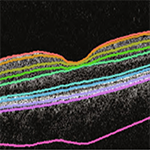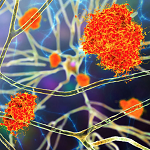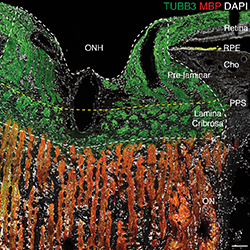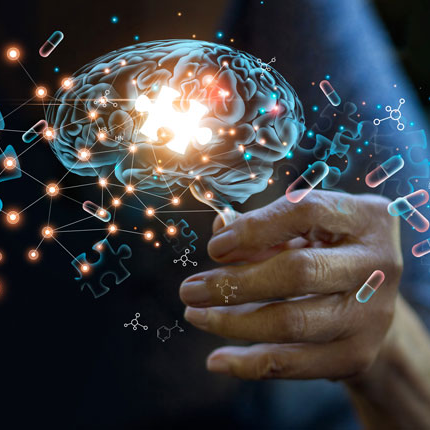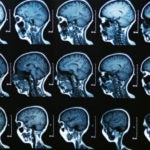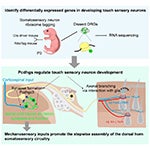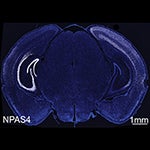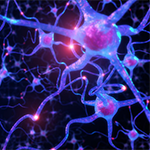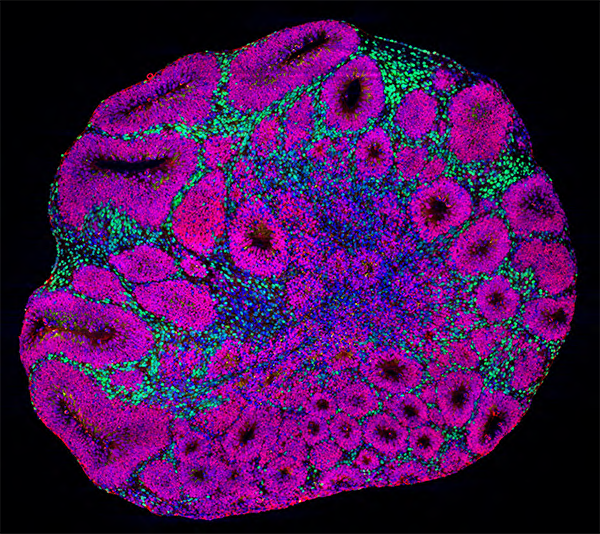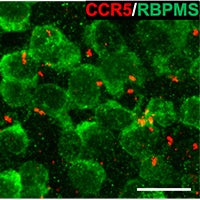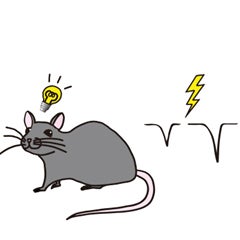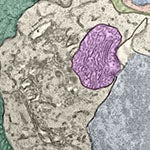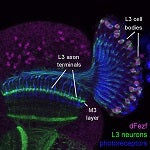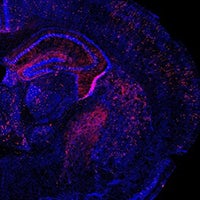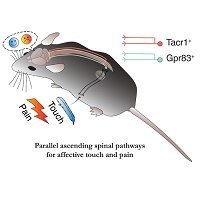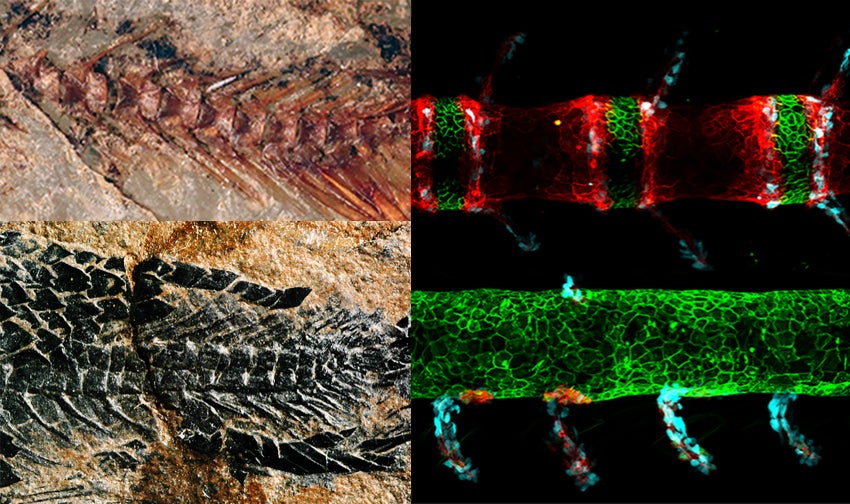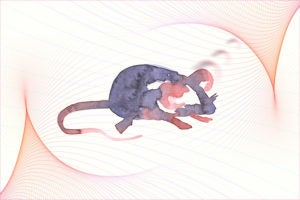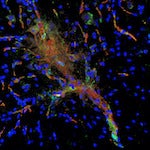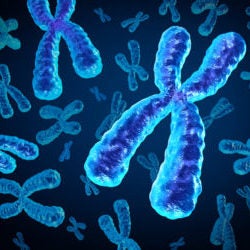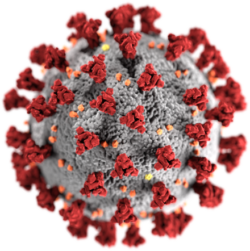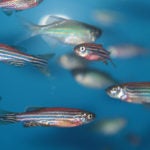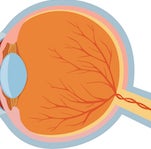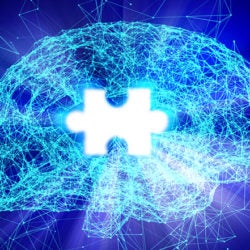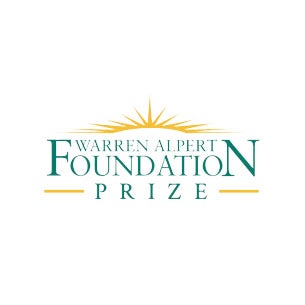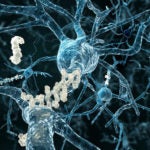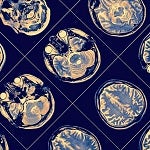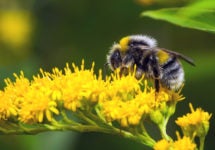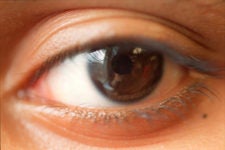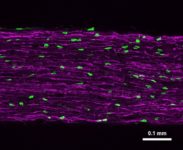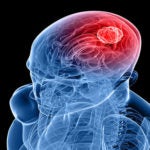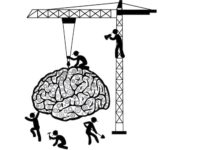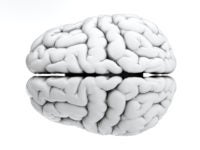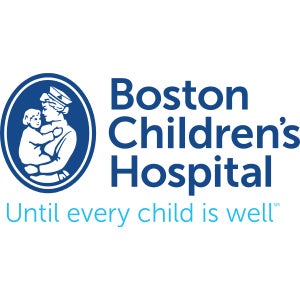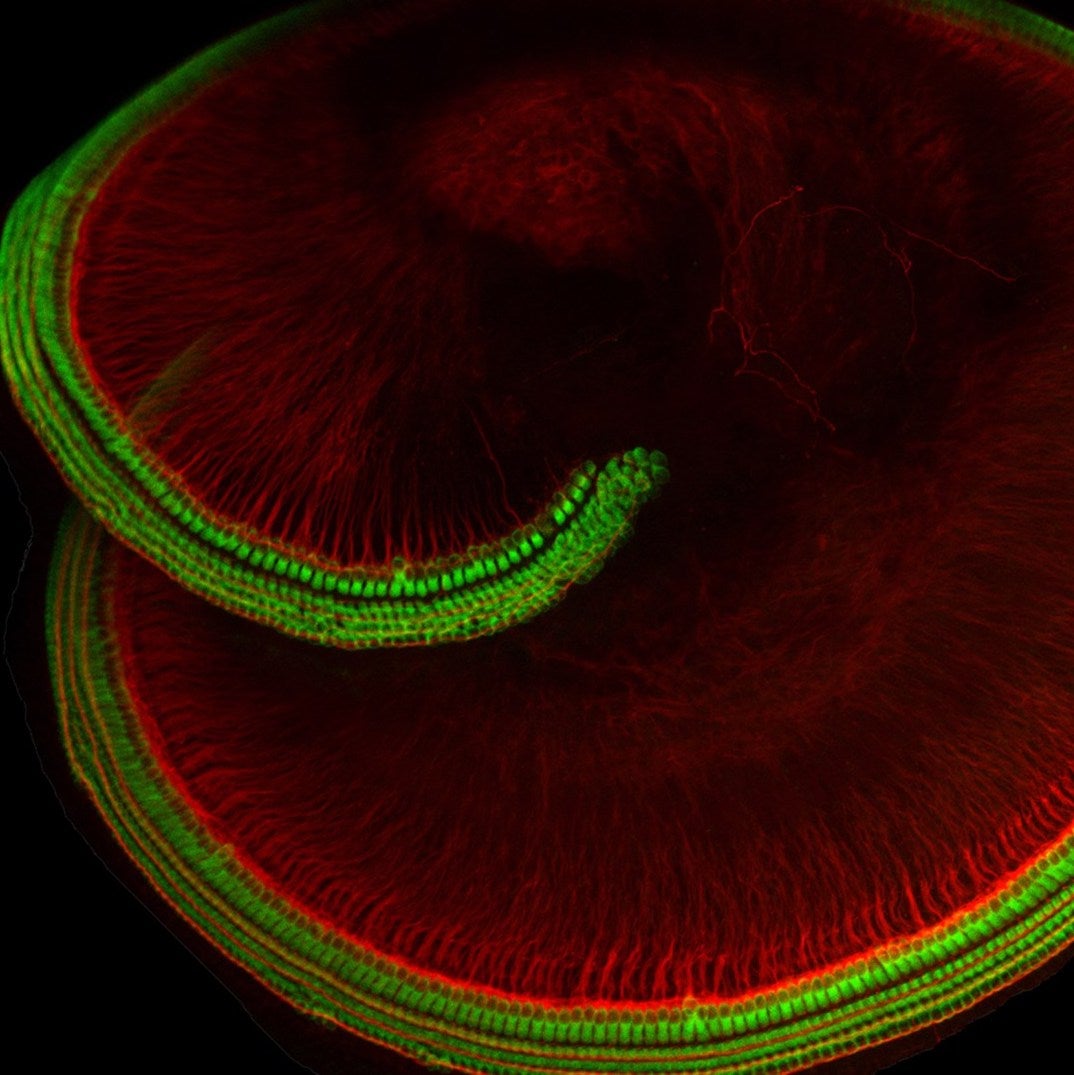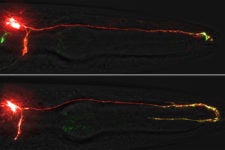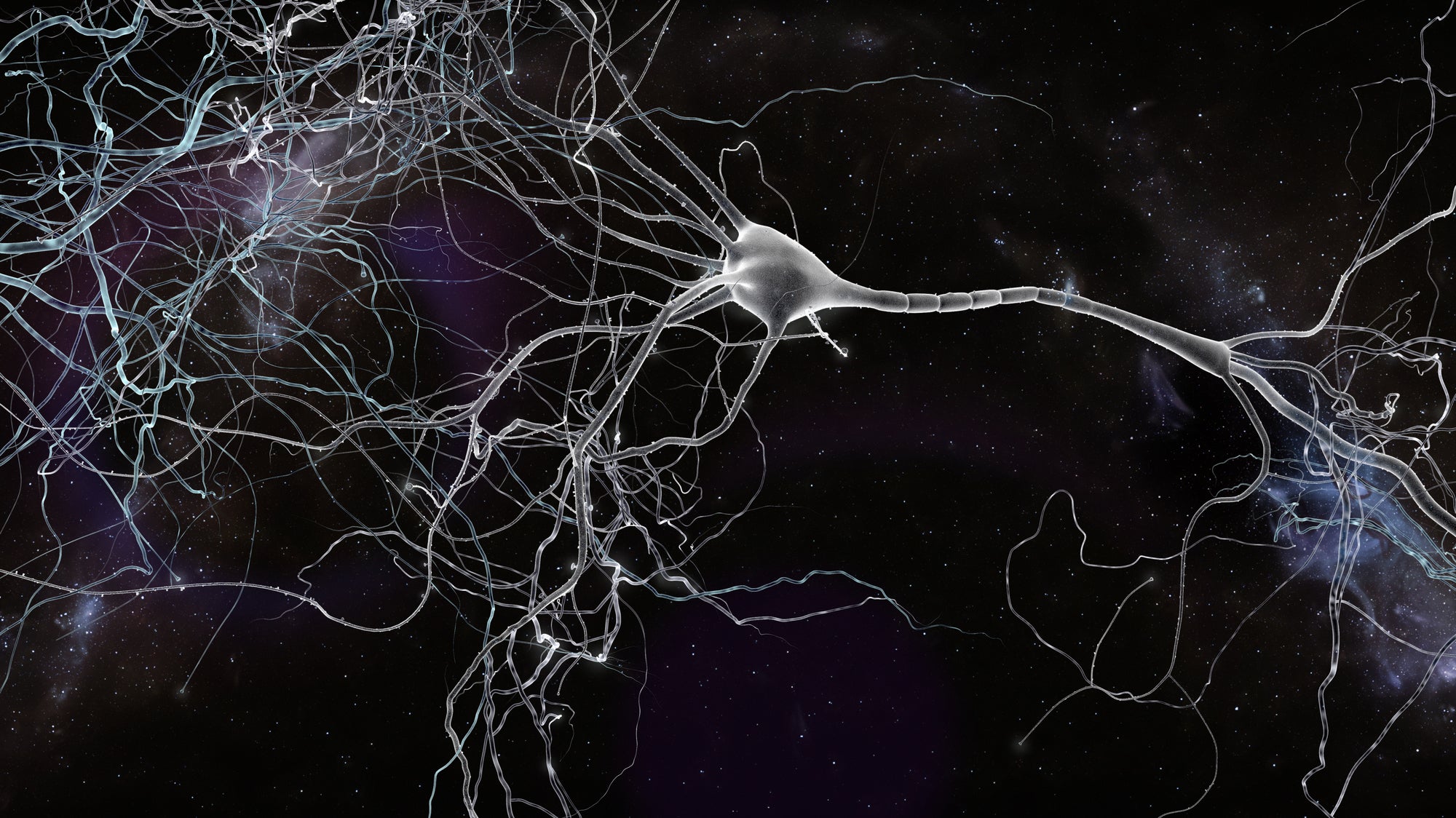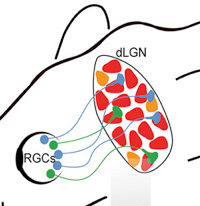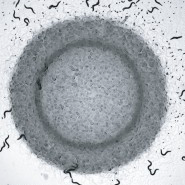Neuro Topics - Genetics
SEARCH OTHER RESEARCH AREAS
November 5, 2024
New research from Anne O'Donnell-Luria, Gemma L. Carvill (Northwestern) and colleagues, first authors Vijay S. Ganesh and Kevin Riquin (Nantes Université). diagnoses for the the first time a patient with a rare genetic disorder caused by changes to the CHASERR gene and highlights the need to examine the non-coding parts of the genome in rare diseases.
Original article in: New England Journal of Medicine >
August 1, 2024
Complement proteins are known to mediate the pruning of synapses by microglia. In new work with implications for our understanding of schizophrenia, Krishna K. Narayanan, Matthew L Baum, Matthew Johnson, and Beth Stevens, and colleagues at Boston Children's Hospital, find that a neuronal protein called CSDM1 opposes the deposition of complement proteins on synapses, making them less vulnerable to engulfment by microglia.
May 21, 2024
HMS News profiles the work of Chirag Patel, others at Harvard, and the Human Exposome Project—which aims to discover the role of various environmental exposures in human disease and health. One such avenue of inquiry showing promise is using AI to help analyze how a lifetime of environmental exposures affects the onset and progression of complex neurological diseases such as Alzheimer's.
February 23, 2024
From the team of Rajat M. Gupta and colleagues. Co-first authors Gavin R. Schnitzler and Helen Kang (Stanford). Featured in HMS News.
New research from Rajat M. Gupta and colleagues, co-first authors Gavin R. Schnitzler and Helen Kang (Stanford), uncover how genetic changes in cells that line blood vessels fuel cardiac disease and brain vessel malformations.
Original article in: Nature >
February 8, 2024
By combining retinal imaging, genetics, and big data, physician-researchers from Harvard Medical School, Mass. Eye and Ear, Massachusetts General Hospital, and the Broad Institute of MIT and Harvard have found that they can estimate how likely a person is to develop eye and systemic diseases in the future.
Original article in: Science Translational Medicine >
October 27, 2023
Harvard MCB Department news article on new research from the lab of Amanda Whipple, first author Daniel Loftus, finding that differences in maternal and paternal genomes in embryonic stem cells shape gene expression in neurons.
Original article in: Genes and Development >
September 13, 2023
HMS News article on new research from Mike Greenberg and colleagues, co-first authors Xin Gu and Christopher Nardone, identifying a protein called midnolin that plays a key role in degrading many short-lived nuclear proteins. The study shows that midnolin does so by directly grabbing the proteins and pulling them into the cellular waste-disposal system, called the proteasome, where they are destroyed.
Original article in: Science >
September 13, 2023
Harvard Gazette article on new research from Tracy Young-Pearse and colleagues using stem cells from patients with Alzheimer’s. They studied the disease risk gene SORL1 and found that loss of normal SORL1 function leads to a reduction in two other key proteins known to be involved in Alzheimer’s -- providing a mechanistic link between strong genetic risk factors.
Original article in: Cell Reports >
August 17, 2023
Josh Sanes shares new research from his lab using single cell RNA sequencing to determine the genes expressed by thousands of single cells to complete a cell atlas of the human eye. This now allows scientists to target specific genes when treating conditions such as glaucoma and other ocular diseases.
Original article in: PNAS >
July 21, 2023
HMS News article on new research from Kun-Hsing Yu and colleagues, co-first authors MacLean P. Nasrallah (Penn) and Junhan Zhao, creating an AI tool that can rapidly decode a brain tumor’s DNA to determine its molecular identity during surgery — critical information can take a few days and up to a few weeks with current approaches.
Original article in: Med >
May 25, 2023
HMS News article on new research from Joseph Arboleda-Velasquez, Yakeel Quiroz, and colleagues. They studied the extraordinary case of a patient with strong genetic predisposition for early-onset Alzheimer’s disease who remained cognitively intact more than two decades beyond the expected age of memory impairment. This led to the discovery of a protective variant, a pathway for ‘resilience’ to dementia, and the identification of a brain region to target with therapies.
Original article in: Nature Medicine >
May 25, 2023
HMS News article on new research from Christopher A. Walsh and Kristopher T. Kahle, co-first authors Sattar Khoshkhoo and Yilan Wang, examining the role of somatic mutations — DNA alterations that occur after conception — in Temporal Lobe Epilepsy (TLE) and suggesting the potential of using existing cancer therapies to treat TLE that is resistant to anti-seizure medications.
Original article in: JAMA Neurology >
May 11, 2023
HMS News article on new research from David Corey, Artur A Indzhykulian, and colleagues, first author Maryna Ivanchenko. Using mice, the team designed a “mini gene” that could in the future be developed into a therapy for Usher Syndrome type 1F, a severe genetic condition that causes blindness and deafness.
Original article in: Nature Communications >
May 5, 2023
Shan Meltzer and Emmanuella Asante share new research from the Ginty lab showing that the clustered protocadherin gamma (Pcdhg) gene locus regulates somatosensory neuron synapse formation, mechanosensory neuron branching patterns, and circuit assembly in the mechanosensory dorsal horn.
Original article in: Cell >
March 9, 2023
Boston Children's Hospital Answers article on new research from Siddharth Srivastava, Annapurna Poduri, and colleagues confirming a previous study finding that about 1 in 4 children with cerebral palsy (CP) who had DNA testing had genetic variants likely to have caused or contributed to their condition.
Original article in: JAMA Neurology >
February 23, 2023
In order for neurons to be ‘plastic’ and adapt in response to environmental stimuli, they must undergo rapid changes in gene expression. Sometimes these rapid changes can lead to DNA damage. Daniel Gilliam and Elizabeth Pollina of the Greenberg lab describe their discovery of a DNA repair pathway that neurons use to address this challenge.
Original article in: Nature >
November 28, 2022
HMS News article on new research from Wade Harper, Tobias Walther, Robert Farese Jr, and colleagues, co-first authors Sebastian Boland, Sharan Swarup, shedding light on the basic biology of frontotemporal dementia caused by a particular genetic mutation.
Original article in: Nature Communications >
September 29, 2022
Boston Children's Hospital Answers article on new research from Joseph Gonzalez-Heydrich, David Glahn, and colleagues, co-first authors Catherine Brownstein and Elise Douard (Université de Montréal) finding that children with early-onset psychosis have similar rates of deleterious copy number variants (CNVs) as children diagnosed with autism spectrum disorder. The new study suggests that all children and adolescents with a psychotic diagnosis might benefit from undergoing genetic screening.
Original article in: American Journal of Psychiatry >
September 20, 2022
HMS News article on new research from the labs of Christopher Harvey and Michael Greenberg, first author Noah Pettit, and second author Lynn Yap, finding that a gene called Fos is a key player in spatial mapping. It helps the brain use specialized navigation cells to form and maintain stable representations of the environment.
Original article in: Nature >
September 20, 2022
Round up of awards and honors earned by the HBI Community
May 4, 2022
HMS News article on new research from Benjamin Neale and colleagues at the Broad Institute, first author Duncan Palmer, revealing new insight into the condition’s molecular underpinnings.
Original article in: Nature Genetics >
March 31, 2022
Yiwen Zhu and colleagues from Erin Dunn’s lab examined in humans the effect of genes previously shown to influence the timing of sensitive periods in animals and the interplay between these genetic factors and exposure to commonly occurring childhood adversities on depression risk. They found that genes regulating sensitive periods associated with depression risk and their expression levels varied over the course of development.
Original article in: Neuropsychopharmacology >
March 8, 2022
HMS News article on a new report on depression commissioned by the Lancet and World Psychiatric Association. The report included recommendations for how health care practitioners, policymakers, community members, and people with depression can work together to build sustainable solutions in response to the ongoing mental health crises caused by the COVID-19 pandemic.
March 8, 2022
Erin Hecht answers this question as part of Harvard Gazette's Wondering, a new series of random questions answered by Harvard experts.
March 8, 2022
Bruna Paulsen shares new research from the labs of Paola Arlotta and colleagues, using organoid models of the human cerebral cortex to uncover cell-type-specific neurodevelopmental abnormalities that are shared across three different ASD risk genes.
February 7, 2022
HMS News article on new research from Siddharth Srivastava, Annapurna Poduri, Mustafa Sahin, and colleagues, first author Maya Chopra, finding that up to 1 in 4 patients with CP have an underlying genetic condition.
Original article in: Annals of Clinical and Translational Neurology >
June 21, 2021
Lili Xie shares new research from the lab of Larry Benowitz showing that the chemokine CCL5 promotes optic nerve regeneration and mediates many of the beneficial effects of Ciliary neurotrophic factor (CNTF) gene therapy.
Original article in: PNAS >
June 11, 2021
Round up of awards and honors earned by the HBI community.
May 6, 2021
Erin Johnson-Venkatesh and Hisashi Umemori share their work trying to understand why X-linked PCDH19-related disorder occurs only in females, and not males – when the opposite is typical for most disorders emanating from mutations on the X-chromosome. They find that inactivation of one copy of Pcdh19 results in a molecular mismatch at hippocampal synapses, leading to functional impairments in female, but not male mice.
Original article in: Science >
April 23, 2021
HMS News article on new research from the lab of Connie Cepko, first author Yunlu Xue, marking an important first step in developing a gene therapy to treat retinitis pigmentosa, or RP, an inherited form of progressive blindness that affects around 20 million people worldwide.
Original article in: eLife >
March 26, 2021
Jing Peng and Ivan Santiago share new research revealing a temporally precise transcriptional cascade that orchestrates the assembly of synaptic layers in the fly visual system. This story is a special piece honoring the memory of their mentor Matt Pecot, who sadly passed away in 2019, with words of remembrance in addition to the scientific update.
Original article in: PNAS >
February 26, 2021
MCB News article highlighting recent radio show and podcast interviews featuring HBI co-director Venkatesh Murthy, discussing the neuroscience of olfaction.
February 26, 2021
Harvard Gazette article on new research from the MGH Center for Genomic Medicine, from the team of Marta Garaulet, Richa Saxena and colleagues, co-first authors Hassan S. Dashti and Iyas Daghla, demonstrating that how often a person takes daytime naps, if at all, is partly regulated by their genes.
Original article in: Nature Communications >
December 10, 2020
Xin Jin, working with the teams of Paola Arlotta, Feng Zhang, Aviv Regev and Joshua Levin, shares the development of in vivo Perturb-Seq, a high-content and scalable method to study cohorts of risk genes implicated in brain disorders.
Original article in: Science >
November 13, 2020
Seungwon (Sebastian) Choi shares new research from the labs of David Ginty and colleagues at the University of Pittsburgh. They applied new mouse genetic tools in conjunction with anatomical, physiological and behavioral approaches to better understand the functional organization of ascending touch, thermal and pain pathways.
Original article in: Nature >
July 28, 2020
HMS News article on new research from the lab of Sandeep Robert Datta and colleagues, co-first authors David H. Brann, Tatsuya Tsukahara, and Caleb Weinreb, demonstrating that olfactory support cells are vulnerable to novel coronavirus infection.
Original article in: Science Advances >
July 1, 2020
HMS News article on a new study from the labs of Matthew Harris and colleagues at Duke University Medical Center and the University of Kansas, bolstering confidence that fish can provide useful models of human spine biology and disorders.
Original article in: Current Biology >
July 1, 2020
BCH Discoveries article on new research from the labs of Jeffrey Holt, David Liu, and colleagues at the Broad and MIT, co-first authors Wei-Hsi Yeh and Olga Shubina-Oleinik, restoring hearing in deaf mice using a new genetic engineering technique.
Original article in: Science Translational Medicine >
May 13, 2020
Harvard Gazette article on new research from the lab of Kevin Eggan, first author Aaron Burberry, identifying a gut-brain connection in mice with a common ALS genetic mutation.
Original article in: Nature >
May 11, 2020
HMS News article on new research from the labs of Steven McCarroll and colleagues, first author Nolan Kamitaki, pinpointing genes underlying sex biases in autoimmune disorders and schizophrenia.
Original article in: Nature >
April 8, 2020
Preliminary research from the lab of Bob Datta, joint first authors David Brann, Tatsuya Tsukahara, and Caleb Weinreb, examines cell types in the olfactory epithelium that might mediate infection by SARS- CoV-2, the causal agent in COVID-19.
April 8, 2020
HMS News article highlighting how Longwood Chorus members create community through song, with quotes from Christopher Chen, postdoctoral fellow in the lab of Wade Regehr, David Mazumder, graduate student in the lab of Gabriel Kreiman and several othe
April 8, 2020
Harvard Gazette article on new research from the labs of Mark Fishman and colleagues, exploring how genes related to psychiatric conditions can influence group behavior in zebrafish.
Original article in: iScience >
March 10, 2020
A monthly round-up of awards and honors earned by Harvard-affiliated faculty, students, and staff.
November 27, 2019
New research from the labs of Joshua Sanes, Zhigang He and colleagues provides novel insights into the CNS injury response of axons and how it might be improved.
Original article in: Neuron >
November 27, 2019
HMS News article on new research from the lab of Yakeel Quiroz-Gaviria and colleagues, first authors Joseph F. Arboleda-Velasquez, Francisco Lopera, and Michael O’Hare, identifying a new gene variant that may protect against Alzheimer's disease.
Original article in: Nature Medicine >
November 1, 2019
The Society for Neuroscience (SfN) presented its highest honor, the Ralph W.Gerard Prize in Neuroscience, to Michael Greenberg and Catherine Dulac.
November 1, 2019
Her research shows how neurons outside of the brain — those that control the sensation of touch — can alter brain function and shape select behaviors associated with autism spectrum disorders (ASD).
November 1, 2019
The 2019 Cowan Award was presented to Dr. Joshua R. Sanes for outstanding contributions in developmental neuroscience.
November 1, 2019
The College on Problems of Drug Dependence (CPDD) has presented McLean Hospital’s Bertha K. Madras, PhD, with its Innovator Award.
November 1, 2019
This award is made possible by a generous gift from the Aramont Charitable Foundation and provides critical funding to advance high-risk, high reward science conducted by graduate students, postdoctoral fellows, and junior faculty.
October 26, 2019
This award challenges investigators at all career levels to pursue new research directions and develop groundbreaking, high-impact approaches to a broad area of biomedical, behavioral or social science.
October 16, 2019
New research from the labs of Bruce Yanker and colleagues, co-first authors Joseph Zullo and Derek Drake, shows that neural activity emerges as a factor in longevity.
Original article in: Nature >
October 4, 2019
Pioneers of optogenetics celebrated at 2019 Warren Alpert Prize Symposium
August 22, 2019
Gene linked to rare disorder also regulates key Alzheimer’s enzyme.
Original article in: Cell >
July 23, 2019
Regardless of what genetic mutation causes glioblastoma, it can readily shift among four distinct cell types, each of which may need to be targeted separately.
July 22, 2019
Hopi Hoekstra was awarded the C. Hart Merriam Award by the American Society of Mammalogists.
July 12, 2019
HMS News article on new research from the lab of Rudolph Tanzi, first author Ana Griciuc, on how crosstalk between certain microglial receptors regulates neuroinflammation in Alzheimer’s disease.
Original article in: Neuron >
July 3, 2019
McLean's Deborah Levy and colleagues provide a proof-of-principle demonstration of symptom relief by targeting a specific genotype and links an individual structural mutation to the pathophysiology of psychosis and treatment response.
Original article in: Biological Psychiatry >
June 24, 2019
the Dean’s Community Service Award was established in 1999 to recognize individuals whose dedication and commitment to community service have made a positive impact on the local, national, or international community.
June 18, 2019
He is profiled in the June 2019 issue of the Proceedings of the National Academy of Sciences.
June 14, 2019
Lucas is a postdoc in the lab of Anne Takesian at Mass Eye and Ear.
June 14, 2019
Jeffrey Moffitt and Alan Brown, faculty at HMS and Boston Children's Hospital, are among 22 earlier career researchers selected by Pew Charitable Trusts to join the Pew Scholars Program in Biomedical Sciences.
June 7, 2019
As dean for graduate education, Segal will be responsible for the strategy, oversight and coordination of graduate education at HMS,
March 25, 2019
Bees and ants have begun to play key roles in neuroscience research. At Harvard alone, at least five labs have recently turned to these non-traditional model organisms to answer questions about social and navigational behaviors.
February 21, 2019
Harvard Gazette story on first cellular atlas of primate retina and its value in understanding blinding diseases, from the lab of Joshua Sanes and colleagues
Original article in: Cell >
January 31, 2019
This paper explores what NK cells do in response to nerve injury and how understanding that could lead to better treatments for pain.
January 30, 2019
HMS News article, on new research from the team of PierPaolo Peruzzi, E. Antonio Chiocca, and colleagues (first author Vivek Bhaskaran), showing how certain microRNAs can weaken brain cancer cells in advance of standard therapy in preclinical models.
Original article in: Nature Communications >
October 10, 2018
BCH Vector Blog post on research from the labs of Fred Alt and colleagues describing a new way to create customized mouse models for studying how specific genes influence brain development or function
Original article in: Nature >
September 21, 2018
BCH Vector Blog post on recent research on the genes involved in the regulation of brain folding, speech motor development from labs of Maria Lehtinen, Christopher A. Walsh and colleagues.
Original article in: Neuron >
August 29, 2018
Boston Children's Hospital Vector blog post about a recent paper from the labs of Christopher A. Walsh and colleagues, unveiling the role of extracellular vesicles in mammalian brain development.
Original article in: Cell Reports >
August 28, 2018
These grants help researchers launch careers in neuroscience and psychiatry and gather pilot data to apply for larger federal and university grants.
August 27, 2018
Harvard Gazette story on new work from the labs of Jeffrey Holt, David Corey and colleagues, revealing identity of a sensor protein that helps inner ear hair cells translate sound and head movements into electrical signals that the brain can process
Original article in: Neuron >
August 24, 2018
HMS News article on a recent study from the lab of Maxwell Heiman suggesting that neuron length must be actively maintained throughout life.
Original article in: PLoS Genetics >
August 21, 2018
Ana Pereira and Yun Zhang describe a new project that was recently awarded funding from the Dean's Competitive Fund for Promising Scholarship
August 9, 2018
HMS News article highlighting recent publication of a cellular atlas of a mouse brain, from the labs of Steven McCarroll and colleagues.
Original article in: Cell >
July 24, 2018
New work from the labs of Michael Greenberg and Chinfei Chen reveals role of the Fn14 protein in visual experience-dependent synapse refinement
Original article in: Neuron >
July 17, 2018
An eLife press release on new work from the labs of Yun Zhang and Joshua Kaplan, exploring how C. elegans sense and avoid nitric oxide in their environments
Original article in: eLife >





